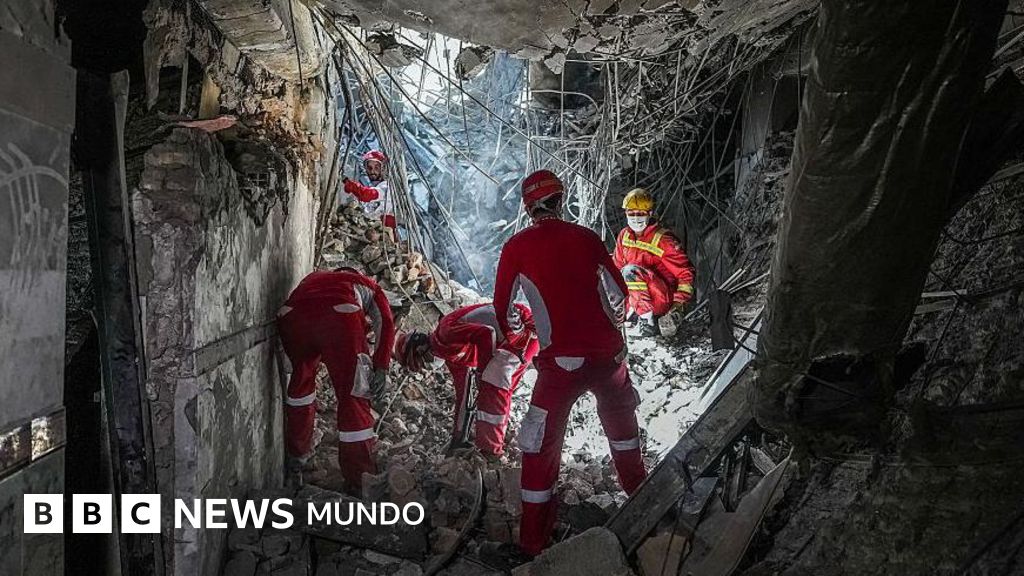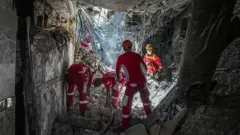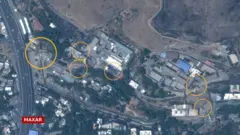

Image source, Getty Images
-
- Author, Farzad sefikaran
- Author's title, Persian service of the BBC
- X,
-
“For me, hell was not the time when Israel attacked; hell was the time when the door (of the cell) did not open us,” Motahareh Goonei told BBC, a political activist who was in isolation in the Evin prison at the time of an Israeli attack.
Goonei had been arrested ten days before after publishing a message in his X account in which he criticized the Iranian government.
On June 23, in the last hours of the 12 -day war between Iran and Israel, the Israeli army attacked one of Iran's most infamous prisons: Evin's prison.
Satellite images, testimonies of face -to -face witnesses and verified recordings obtained by the Persian BBC service reveal new details of the attack and the people who died.
The BBC has independently verified the identities and circumstances surrounding the death of three of the victims of the attack, including an Iranian-American prisoner, through interviews with their relatives.
Until now, Iranian authorities have only revealed the names and identities of prison staff.
The high security complex, located in the northern end of Tehran, the Iranian capital, has housed thousands of political prisoners during the last half century, both before the 1979 Revolution and under the current ruling authorities of the country.
That June day, Evin's prison became the most deadly Israeli attack on Iranian soil in terms of civil victims.
Iranian authorities claim that 80 people died, including penitentiary personnel, inmates, health workers, visitors and residents of nearby neighborhoods.
In a report published on August 14, Human Rights Watch said that Israeli air attacks against the Iranian Penitentiary Complex of Evin were indiscriminate and illegal and constituted an apparent war crime.
The Israel Defense Forces (FDI) affirmed that the reason for the attack against Evin's prison was that the facilities were “using intelligence operations against Israel.”
“In the midst of chaos, the prisoners helped their guards”
Motahareh Goonei remembers the moment in which the explosions shook the enclosure.
“When I heard the third explosion, I knew there was no way out. I hit the door with all my strength, but I didn't open. I thought: this is the end of your life, say goodbye.”

Image source, Content generated by users
Liberated from her cell by another prisoner, Motahareh Goonei staggered between a thick and suffocating smoke. Goonei states that prison guards initially tried to prevent inmates from escaping, and that some interrogators even threatened them.
However, in scenes that she described as “horrible but humanizing,” the prisoners rushed to help the wounded guards, reassuring an officer who was panic and selling the wounds of an interrogator that cried.
Other inmates from another room rushed to help doctors and nurses trapped in the prison clinic. Saeedeh Makarem, one of Evin's doctors who was seriously injured in the attack, later wrote on Instagram what happened: “The same prisoners whom I once tried to save my life.”
Another woman held in Evin, who spoke on condition of anonymity for fear of her safety, described the moment of the attack on the BBC:
“At the beginning there were several explosions in rapid succession, and the noise lasted about two minutes. Initially we stayed in our beds because the windows had broken, then we dressed and we all helped down the older women. No one from the prison helped us, closed the door and told us that we could not leave.”
The magnitude of the attack
The BBC analysis indicates that Israel attacked Evin with at least six projectiles, damaging at least 28 buildings within the complex.

Image source, Maxar
The IDF affirm that they carried out a “selective attack” against “a symbol of the oppression of the Iranian people” and ensure that measures were taken to minimize damage to the civilian population.
However, a relative of a political prisoner who came to visit him a few minutes after the explosions said that “those who left the prison said there were corpses everywhere. Some inmates had left, but none tried to escape, they were only stunned.”
Iranian authorities claim that 75 inmates fled during chaos. Some were later captured or returned voluntarily.
Among the deceased: prisoners, guards and visitors
The Iranian authorities claim that of the 80 people killed in the attack, 42 were prison officials and five were inmates. Their names have not been revealed.
The Persian BBC service has confirmed that Masoud Behbahani, a citizen with dual Iranian and American nationality, was one of these inmates. He had been imprisoned for financial crimes.
His family received contradictory versions about his death from the Iranian prison organization: either fell during the attack and suffered a heart attack, or suffered a heart attack during the evacuation, followed by a mortal coma after a delay in treatment.

Image source, BBC / content generated by users
Arvin Mohammadi, 37, died in the administrative building while paying the bail for the temporal liberation of his father, according to his wife to the BBC.
Mehrangiz Imanpour, 61, an outstanding artist and painter whose house was close to Evin's prison, is another victims whose identity has been able to confirm the BBC.
Khandan Mahabadi, renowned Iranian writer and excess of Imanpour, Due to the force of the explosion, his body was found outside the perimeter of the enclosure.
Among the other fatal victims of the attack were the mother of a one -year -old boy, a philanthropist who visited the prison to manage the release of a prisoner, five social workers, 13 young military recruits and the 5 -year -old son of one of the social workers.
After the attack on the Evin prison, the fate that transgender prisoners have run. Some media said that 100 transgender inmates had died, but the investigation of the BBC Persian service reveals that this is not true.
Shafakhah says, an Iranian lawyer who has been following the situation of transgender inmates, told the BBC: “There is a great concern for their situation. No one knows where they are now.”

Image source, Getty Images
Why attack Evin?
Israel alleged that the prison was being used for “intelligence operations against Israel, including counter -signs”, but has not answered the BBC questions about the exact objectives or weapons used, nor about whether he foresaw the death of civilians.
A month after the attack, Amnesty International published a report on the incident. “Directing attacks against civil objectives is strictly prohibited by International Humanitarian Law. Carrying out such attacks and deliberately constitutes a war crime,” said Erika Guevara Rosas, senior director of research, defense, politics and campaigns.
The UN Human Rights Office declared that Evin “was not a military objective” and that the attack violated international humanitarian law.
Tom Dannenbaum, a professor of international law at the University of Tufts, told the BBC that each section of the prison should be evaluated according to their military relevance.
According to the information available, he said, all fatalities were civilians: guards, inmates, visitors and local residents.

Image source, Getty Images
After the attack: the fate of the prisoners
After the Israeli attack on Evin prison, the facilities were completely evacuated.
After the deployment of a large number of security forces, inmates, among which were political dissidents, told the BBC that they were transferred by force and violently to other places, with the guards using wives and shackles.
The inmates were sent to the Qarchak prison and the men to Tehran Bozorg (Fashafuyeh) prison, both located in the desert south of Tehran.
The Iranian judiciary announced, 45 days after the attack, that the detainees returned to Evin, amid accusations of inmates and human rights organizations of new acts of violence and humiliation against political prisoners.
Some inmates told the BBC that they were ordered to put handcuffs in the hands and legs and, when refusing, they were surrounded by the guards, forced to leave the vehicles and subjected to physical aggressions. The elderly detainees were injured and some were handcuffed while laying on the street.
Iranian judicial officials have denied having physically assaulted prisoners or having paid handcuffs in their hands and legs.
Some inmates denounce that this brutality, which occurred both during the evacuation and after they were returned to the Evin prison, went precisely against those who, despite having the opportunity to escape during Israeli bombing, decided not to flee and, instead, they hurried to help rescue the people who had been trapped under the rubble.
The Persian BBC service is prohibited in Iran by the Government, and so far Iranian officials have not responded to our requests for comments or interviews.

Subscribe here To our new newsletter to receive every Friday a selection of our best content of the week.
And remember that you can receive notifications in our app. Download the latest version and act.